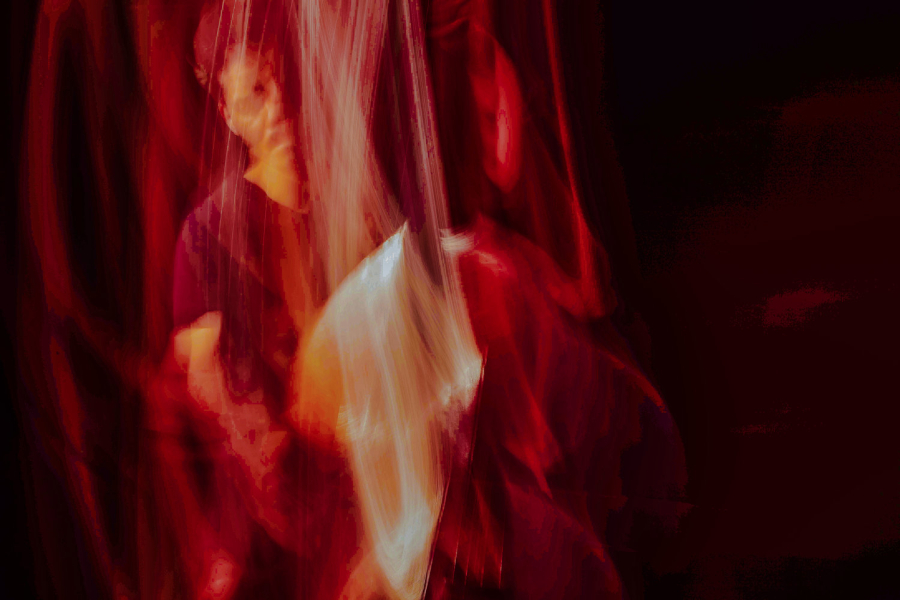In an age where you can stream uncountable hours of recorded music from the comfort of your own home, why brave the tumult of the MTA on a sleety Monday evening to hear a live concert? Because sometimes that concert is sun burns out your eyes, the first offering in bassist and composer Brandon Lopez’s year-long residency at Roulette. Also featuring saxophonist Steve Baczkowski, drummer Gerald Cleaver, and, after the intermission, electronic artist Cecilia Lopez, sun burns out your eyes was a moody, captivating evening that needed to be seen as well as heard.
The evening began with Brandon Lopez alone on the bass, bowing out a gestural, fragmented introduction. He’s a focused player, disappearing into himself as he teases out angular leaps and juddering sighs from his instrument. Watching his lithe performance over the course of the evening felt like watching a pas de deux between him and his bass, as choreographed by an iconoclastic post-modern dancemaster.
Brandon Lopez
Photograph: Cameron Kelly,
courtesy of Issue Project Room

When Baczkowski and Cleaver joined in, they each brought their own distinctive physicalities. Baczkowski was expansive, roaming freely around his side of the stage—at one point he knelt on the floor and used his thigh as an impromptu mute for his tenor saxophone. Other objects that served as mutes included empty tin cans and a Tibetan prayer bowl. The results ranged from an atmospheric muffling to a distorted buzz so intense it could have come from an overdriven electric guitar.
Cleaver was solid and settled, producing a thicket of densely interlocking cross-rhythms with an artful minimum of movement. The climax of his virtuosic nonchalance came in an extended solo where he drew such a multi-layered tapestry of rhythm and timbre from his drumset that he sounded like an entire combo unto himself.
The overall impression was of three independent monologues going on at the same time, which just so happened to sync up perfectly into an intricate whole. There was little obvious communication between the players, but the group still moved as an impeccable unit, turning on a dime from an explosive climax to a mellow playoff, or snapping abruptly into a tight groove. Their music reflected this interdependent individualism, straining furiously against the constraints of regularity.

Cecilia Lopez was an uneven addition in the second half. Her previous work that I’ve seen has a sere, meditative aspect – she can draw out a single note or chord until it unfurls into a universe – and her contributions here were largely overwhelmed in the full quartet’s propulsive tumult. Her electronics worked best in her duets with other band members — a sinuous counterpoint with Brandon Lopez’s bass, or a playful riff on Baczkowski’s squealing whistle tones that sounded like whale song on helium — and in the hushed, secretive passage that slowly brought the quartet to life after intermission.
Brandon Lopez has several albums available to stream on his website, but for my money, they’re a wan echo of the experience of seeing him live. The musical intensity is all there, to be sure, but the physicality of his performance brings things to an entirely different level. He is sure to have more concerts in 2020 for his Roulette residency; see them in person if you possibly can.
Brin Solomon writes words and music in several genres and is doing their best to queer all of them. Solomon majored in composition at Yale University before earning their MFA in Musical Theatre Writing at NYU/Tisch. Their full-length musical Window Full of Moths has been hailed for its “extraordinary songs” that “add magic to otherwise ordinary lives”, and their latest one-act, Have You Tried Not Being A Monster, has been described as “agitprop for Julia Serrano.” Their writing has appeared in VAN, New Classic LA, and National Sawdust Log, and they recently won runner-up at the 2018 Rubin Institute for Music Criticism.
Classical music coverage on National Sawdust Log is supported in part by a grant from the Rubin Institute for Music Criticism, the San Francisco Conservatory of Music, and the Ann and Gordon Getty Foundation. The Log makes all editorial decisions.